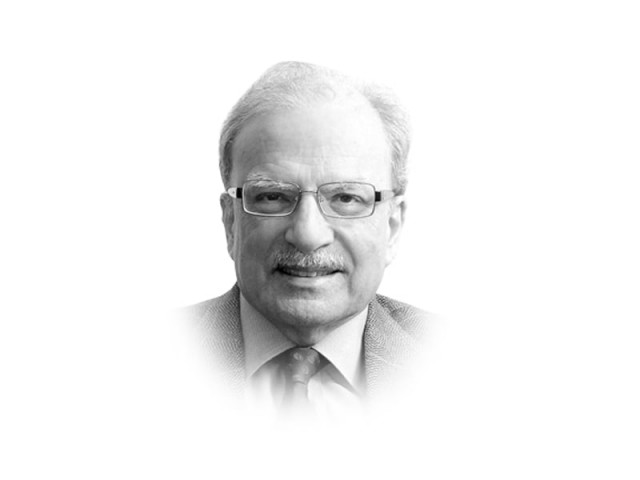The three E’s
A state, especially a weak one, cannot do much on its own; a great deal has to be done by the people themselves.

The writer is a former caretaker finance minister and served as vice-president at the World Bank
The third ‘E’ in Prime Minister Sharif’s to-do list is by far the most important one for his administration. This refers to extremism. Although the government is struggling to find a way out of it, it has not defined it, understood its scope, recognised that it has thrown deep roots in the country’s soil, and developed a comprehensive strategy that will have the full support of the majority of the country’s population.
Let us begin with the definition. According to the dictionary, extremism is a political philosophy that resorts to measures beyond the norm. It is remote, outermost, farthest from what the society considers to be normal. In other words, it is adopted by a group or groups of people who occupy the fringes of society. They are not comfortable with being part of the mainstream — in politics, in economics and in religious beliefs. Starting with this as the definition we can see why extremism and extremists have become problems for societies such as Pakistan.
But extremism is not practiced by one group of people. In Pakistan’s case, there are several groups of extremists operating in different parts of the country or aiming their ire and activities at different segments of society. There are those who have refused to accept the authority of the Pakistani state or the ideology the country’s majority feels comfortable with. This form of terrorism is also the one that has inflicted the heaviest human toll and done the most damage to the economy. Then there is violence in Karachi that has its roots in the series of migrations that have produced what Steve Inskeep in his book calls the ‘instant city’. The third kind of extremism also goes by the name of sectarianism — it pertains to the lack of tolerance towards people who are not prepared to accept points of view and systems of beliefs different from their own.
Ever since Prime Minister Sharif took the reins of the government in Islamabad, there have been calls on him to frame the state’s response towards extremism. This, many believe, needs a well thought out strategy that has the support of the people. This demand led to the convening of the All Parties Conference on September 9, 2013 that called for negotiations between the state and one group of extremists. Such an approach leaves out the other extremists with different agendas. The point of this series of articles is to suggest that what is required is not one strategy but a number of them, each focused on different aspects of extremism. We could think in terms of a ‘grand strategy’ but that won’t work since strategising grandly means being able see all the components of a problem to be solved. That cannot be done with the phenomenon of extremism given its dynamic nature.
Various groups of extremists are able to have an impact since the state is too weak to contain their activities. The state has to be strengthened in order to eliminate the fringe or push it out even further from the centre. But what is meant by a weak state? This question has preoccupied political scientists and sociologists for a long time and has now begun to interest economists as well. Half a century ago, the sociologist and economist Gunnar Myrdal in his book Asian Drama identified the reason for Asia’s relative backwardness as the ‘soft state’ — a state that did not have the institutional wherewithal to work for society’s advancement. The word institution, as used by economists, goes beyond encompassing only organisations; it also means the informal rules that govern how people interact with one another.
Since extremism can only be tackled by patient institution-building and by educating the populace about their rights and duties, the task will take time. A state, especially a weak one, cannot do much on its own; a great deal has to be done by the people themselves. It is for this reason that the nature of the terrorism problem — how it has come about and how it has affected some segments of society more than others — needs to be carefully described and analysed. We must look back at our history to find some clues as to why extremism has become such a problem for the country. This I will begin to do with the article next week.
Published in The Express Tribune, December 9th, 2013.
Like Opinion & Editorial on Facebook, follow @ETOpEd on Twitter to receive all updates on all our daily pieces.















COMMENTS
Comments are moderated and generally will be posted if they are on-topic and not abusive.
For more information, please see our Comments FAQ